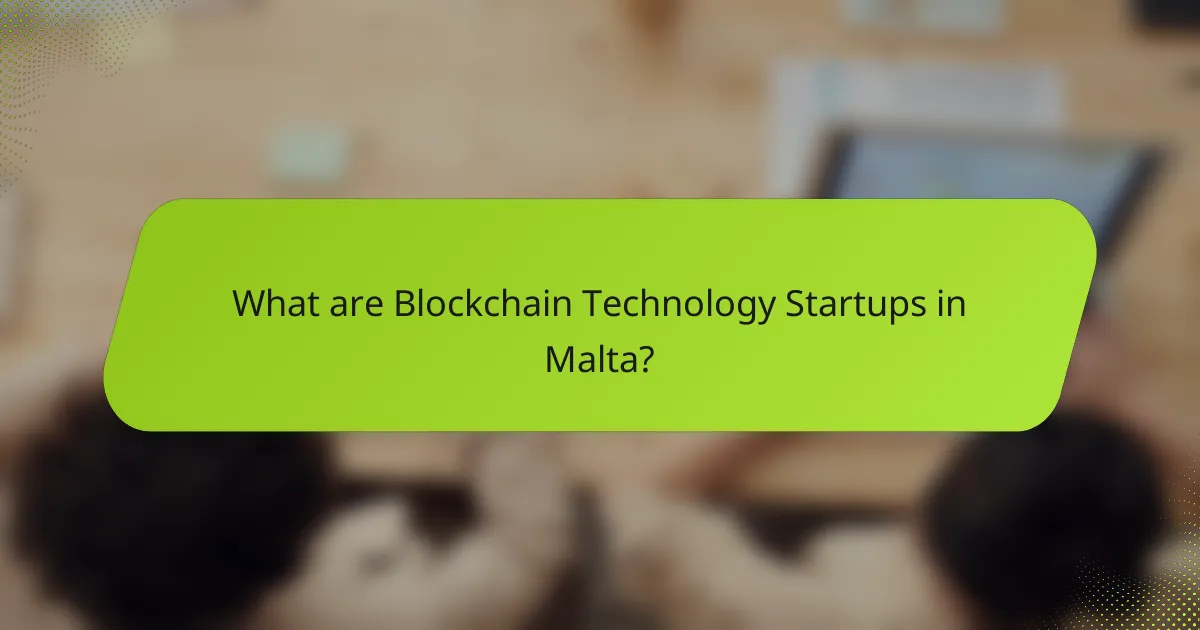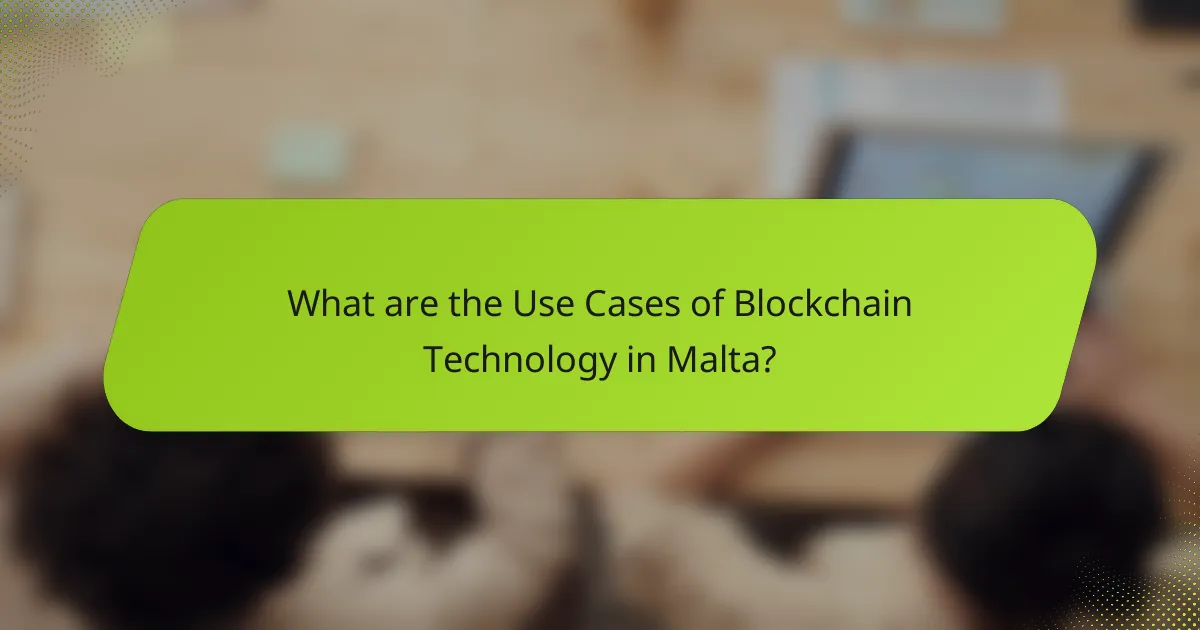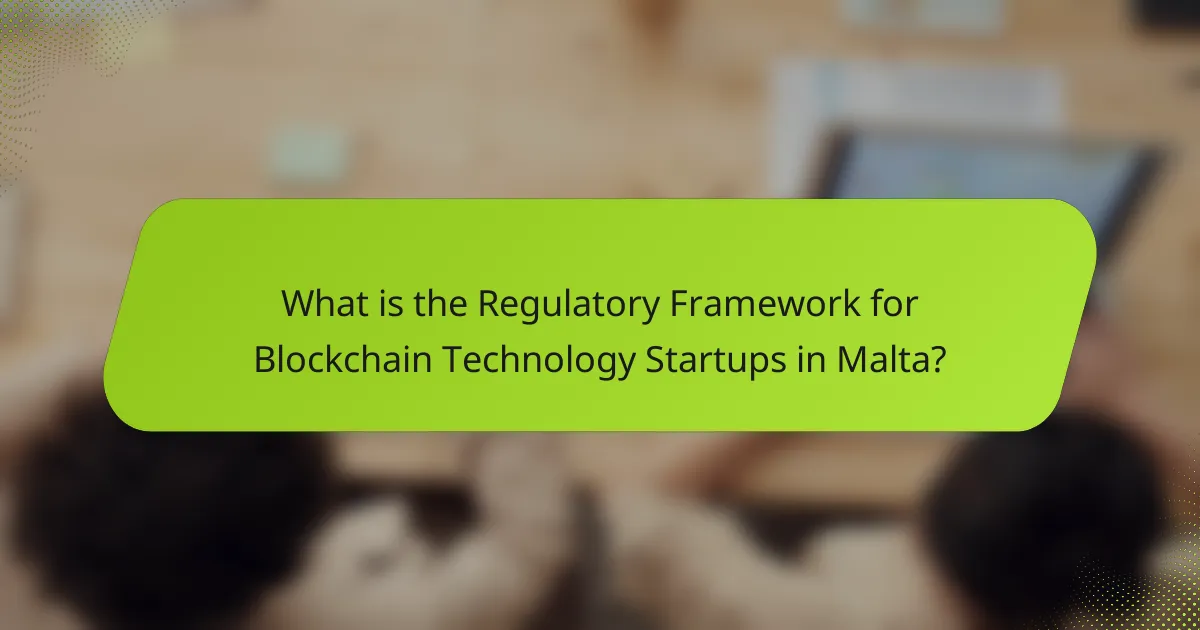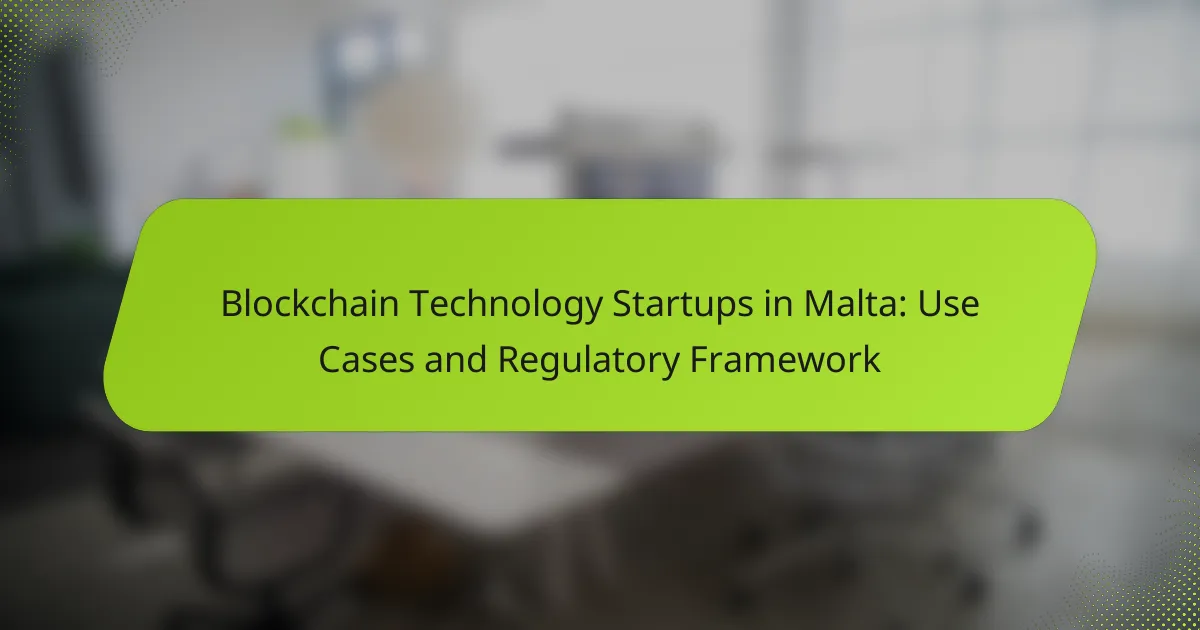
What are Blockchain Technology Startups in Malta?
Blockchain technology startups in Malta are companies that leverage blockchain technology to create innovative solutions. Malta has become a hub for such startups due to its supportive regulatory framework. The Maltese government introduced the Virtual Financial Assets Act in 2018, which provides clear guidelines for blockchain operations. This legal clarity attracts entrepreneurs and investors to the region. Startups in Malta focus on various sectors, including finance, gaming, and supply chain management. They aim to enhance transparency, security, and efficiency through decentralized technologies. The presence of a skilled workforce and collaboration with academic institutions further supports the growth of these startups. Malta’s strategic location in Europe also offers access to a larger market for blockchain innovations.
How do Blockchain Technology Startups operate in Malta?
Blockchain technology startups in Malta operate within a regulated framework that supports innovation. The Maltese government has established a legal structure for blockchain and cryptocurrency activities. This includes the Virtual Financial Assets Act, which provides guidelines for licensing and compliance. Startups must register with the Malta Financial Services Authority (MFSA). They are required to adhere to anti-money laundering (AML) and counter-terrorism financing (CTF) regulations. Malta’s regulatory environment aims to attract businesses by offering clarity and security. The country has positioned itself as a blockchain hub in Europe. This is evidenced by the increasing number of startups and investments in the sector.
What are the key characteristics of Blockchain startups in Malta?
Blockchain startups in Malta are characterized by regulatory clarity, innovation, and a focus on compliance. The Maltese government has established a comprehensive legal framework for blockchain technology. This framework includes the Malta Digital Innovation Authority Act, which promotes transparency and security. Startups often leverage Malta’s favorable tax regime to enhance profitability. Many blockchain companies in Malta focus on decentralized finance (DeFi) and tokenization. The presence of a skilled workforce in technology and finance supports startup growth. Malta also hosts numerous blockchain events, fostering community and collaboration. These characteristics position Malta as a leading hub for blockchain innovation in Europe.
How do these startups differ from traditional tech companies?
Blockchain technology startups differ from traditional tech companies primarily in their business models and operational frameworks. Startups often focus on decentralized solutions, leveraging blockchain for transparency and security. Traditional tech companies typically operate on centralized systems, prioritizing control and data ownership.
Startups often emphasize innovation and rapid iteration, allowing them to adapt quickly to market changes. In contrast, traditional companies may have more rigid structures, which can slow down decision-making processes. Furthermore, blockchain startups often seek to disrupt existing industries, while traditional tech companies may aim for incremental improvements within established frameworks.
The funding model also differs; startups frequently rely on venture capital and crowdfunding, whereas traditional companies may depend on established revenue streams and investor confidence. This funding approach allows blockchain startups to experiment with novel concepts without the constraints faced by traditional firms.
In summary, the core differences lie in decentralization, innovation pace, industry disruption focus, and funding models. These factors collectively define the unique landscape of blockchain startups compared to traditional tech companies.
What is the significance of Blockchain Technology in Malta?
Blockchain technology is significant in Malta due to its role in establishing the country as a leading blockchain hub in Europe. Malta has implemented a regulatory framework that fosters innovation and attracts blockchain startups. The Malta Digital Innovation Authority oversees the regulation of blockchain technology and related services. This framework provides legal certainty for businesses and enhances investor confidence. Malta’s proactive approach has resulted in numerous blockchain companies setting up operations in the country. Additionally, Malta’s government supports initiatives to educate and promote blockchain technology. The country’s strategic location in the Mediterranean also facilitates access to European markets. Overall, Malta’s significance in blockchain technology stems from its supportive regulatory environment and commitment to innovation.
Why is Malta considered a hub for Blockchain innovation?
Malta is considered a hub for Blockchain innovation due to its progressive regulatory framework. The Maltese government has implemented clear laws that support the development of blockchain technology. This includes the Virtual Financial Assets Act, which provides a legal structure for cryptocurrency and blockchain businesses. Malta’s favorable tax regime also attracts international companies. The country has established itself as a testing ground for new blockchain applications. Additionally, Malta hosts numerous blockchain events and conferences, fostering a vibrant community. These factors collectively position Malta as a leader in the blockchain sector.
How does Blockchain technology impact the Maltese economy?
Blockchain technology positively impacts the Maltese economy by fostering innovation and attracting investment. It enhances transparency and security in various sectors, including finance and supply chain management. Malta’s government has embraced blockchain by creating a regulatory framework that supports startups. This framework encourages foreign investment and positions Malta as a hub for blockchain innovation. The presence of blockchain companies contributes to job creation and economic growth. In 2021, the blockchain sector in Malta was estimated to generate millions in revenue. The country’s proactive stance on blockchain has led to an increase in technology-related educational programs, further fueling economic development.

What are the Use Cases of Blockchain Technology in Malta?
Blockchain technology in Malta has several prominent use cases. One significant application is in the financial services sector. Blockchain enhances transparency and efficiency in transactions. It allows for faster cross-border payments. Another use case is in supply chain management. Companies utilize blockchain to track products from origin to consumer. This increases accountability and reduces fraud. Additionally, blockchain is used in digital identity verification. It provides secure and immutable records for individuals. The real estate sector also benefits from blockchain. It simplifies property transactions through smart contracts. Malta’s regulatory framework supports these innovations. The government promotes blockchain adoption across various industries.
What industries are adopting Blockchain Technology in Malta?
The industries adopting Blockchain Technology in Malta include finance, gaming, and supply chain management. The financial sector utilizes blockchain for secure transactions and digital currencies. The gaming industry leverages blockchain for transparent and fair gaming experiences. Supply chain management benefits from blockchain through enhanced tracking and traceability of goods. Additionally, healthcare is exploring blockchain for secure patient data management. These industries are increasingly recognizing the advantages of blockchain in improving efficiency and security.
How is Blockchain used in the financial sector in Malta?
Blockchain is used in the financial sector in Malta primarily for enhancing transparency and security in transactions. Financial institutions utilize blockchain technology to streamline processes and reduce costs. This includes applications in payment systems, asset management, and compliance. The Malta Financial Services Authority (MFSA) has established a regulatory framework to support blockchain innovation. This framework promotes the use of Distributed Ledger Technology (DLT) for financial services. Malta aims to be a global hub for blockchain and cryptocurrency businesses. The country’s progressive regulations attract numerous blockchain startups and projects. These initiatives contribute to Malta’s reputation as a leader in blockchain adoption within the financial sector.
What are the applications of Blockchain in supply chain management?
Blockchain technology has various applications in supply chain management. It enhances transparency by providing a tamper-proof ledger of transactions. This allows all parties to access real-time data about product movements. Blockchain improves traceability, enabling companies to track the origin of goods. It reduces fraud and errors by ensuring data integrity. Smart contracts automate processes, reducing the need for intermediaries. This leads to cost savings and increased efficiency. Companies can use blockchain for inventory management, optimizing stock levels. Overall, blockchain streamlines operations and fosters trust among supply chain partners.
What innovative projects are being developed by Blockchain startups in Malta?
Blockchain startups in Malta are developing innovative projects across various sectors. One notable project is the creation of decentralized finance (DeFi) platforms. These platforms enable users to engage in financial services without intermediaries. Another project focuses on blockchain-based identity verification systems. This enhances security and efficiency in user authentication processes. Additionally, startups are working on supply chain solutions using blockchain technology. These solutions improve transparency and traceability in product sourcing and distribution. Furthermore, some startups are exploring tokenization of real estate assets. This allows for fractional ownership and easier investment access. Malta’s regulatory framework supports these innovations, fostering a conducive environment for blockchain development.
How are startups utilizing Blockchain for social impact?
Startups are utilizing blockchain for social impact by enhancing transparency, accountability, and efficiency in various sectors. They implement blockchain to track charitable donations, ensuring funds reach intended recipients. For example, projects like BitPesa facilitate cross-border payments for humanitarian aid. Startups also use blockchain to create decentralized platforms for social services, improving access for underserved communities. A notable case is Provenance, which enables consumers to trace product origins, promoting ethical sourcing. Additionally, blockchain helps in secure identity verification, aiding refugees in accessing essential services. These applications demonstrate the transformative potential of blockchain in addressing social challenges.
What role does Blockchain play in enhancing transparency and security?
Blockchain enhances transparency and security by providing a decentralized and immutable ledger. This technology allows all participants in a network to access a single source of truth. Each transaction is recorded in a block and linked to the previous block, creating a chain that is resistant to tampering.
The use of cryptographic techniques ensures that data is secure and only accessible to authorized users. According to a study by the World Economic Forum, blockchain can reduce fraud and increase trust among parties. The transparency of transactions allows for real-time auditing and accountability, making it easier to trace the flow of assets.
In industries like finance and supply chain, blockchain’s ability to verify transactions enhances security. This reduces the risk of data breaches and unauthorized access. Overall, blockchain’s unique attributes contribute significantly to improved transparency and security in various applications.

What is the Regulatory Framework for Blockchain Technology Startups in Malta?
The regulatory framework for blockchain technology startups in Malta is primarily governed by the Malta Financial Services Authority (MFSA). Malta has established a comprehensive legal structure for blockchain and cryptocurrency through three key acts: the Virtual Financial Assets Act, the Innovative Technology Arrangements and Services Act, and the Malta Digital Innovation Authority Act.
These acts provide a clear regulatory environment for initial coin offerings (ICOs), cryptocurrency exchanges, and other blockchain-related services. The Virtual Financial Assets Act outlines the requirements for token issuers and service providers. It mandates registration and compliance with anti-money laundering (AML) and counter-terrorism financing (CTF) regulations.
The Innovative Technology Arrangements and Services Act establishes a framework for the certification of blockchain technology providers. This includes guidelines for the development and operation of decentralized applications. The Malta Digital Innovation Authority Act oversees the regulation and promotion of innovative technologies in Malta.
This regulatory approach has positioned Malta as a leader in blockchain technology and attracted numerous startups to establish operations in the country. The legal clarity and supportive ecosystem are critical factors driving this growth.
What regulations govern Blockchain startups in Malta?
The regulations governing blockchain startups in Malta include the Virtual Financial Assets Act (VFAA), the Innovative Technology Arrangements and Services Act (ITAS), and the Maltese Financial Services Authority (MFSA) guidelines. The VFAA provides a regulatory framework for initial coin offerings and cryptocurrency exchanges. It mandates registration and compliance with anti-money laundering laws. The ITAS governs the certification of innovative technology arrangements, ensuring they meet specific standards. The MFSA oversees the licensing of blockchain businesses, ensuring adherence to financial regulations. Malta aims to create a secure environment for blockchain innovation while protecting consumers and investors.
How does the Maltese government support Blockchain innovation?
The Maltese government supports blockchain innovation through a comprehensive regulatory framework. This framework provides legal clarity for blockchain and cryptocurrency businesses. Malta established the Malta Digital Innovation Authority to oversee blockchain projects. The government also offers incentives for startups, including tax benefits and grants. Furthermore, Malta has attracted major blockchain companies, enhancing its reputation as a blockchain hub. The country has hosted international blockchain conferences to promote collaboration. These efforts demonstrate Malta’s commitment to fostering a vibrant blockchain ecosystem.
What are the compliance requirements for Blockchain startups in Malta?
Blockchain startups in Malta must adhere to specific compliance requirements. These include obtaining a license from the Malta Financial Services Authority (MFSA). The license is essential for operating as a Virtual Financial Asset (VFA) service provider. Startups must also comply with the VFA Act, which mandates transparency and consumer protection measures.
Additionally, startups are required to implement Anti-Money Laundering (AML) and Counter-Terrorism Financing (CTF) policies. This includes conducting due diligence on customers and reporting suspicious activities. They must also maintain proper records of transactions and customer information.
Compliance with the General Data Protection Regulation (GDPR) is also necessary. This ensures that personal data is handled in accordance with EU regulations. Furthermore, startups must submit a white paper detailing their project, which is subject to review by the MFSA.
These requirements aim to foster a secure and regulated environment for blockchain innovation in Malta.
How does Malta’s regulatory environment compare to other jurisdictions?
Malta’s regulatory environment is considered one of the most progressive for blockchain technology. It offers a clear legal framework that supports innovation and development. The Malta Digital Innovation Authority (MDIA) oversees blockchain projects, ensuring compliance and security. This regulatory clarity attracts startups seeking a stable environment. In contrast, many jurisdictions lack such comprehensive regulations. For example, countries like the USA have fragmented regulations across states. This creates uncertainty for blockchain startups in those regions. Malta’s approach fosters trust and encourages investment in the blockchain sector. Consequently, it has positioned itself as a global leader in blockchain regulation.
What advantages does Malta offer over other countries for Blockchain startups?
Malta offers several advantages for blockchain startups compared to other countries. Its regulatory framework is specifically designed to support blockchain technology. Malta was one of the first countries to establish comprehensive legislation for blockchain and cryptocurrencies. This includes the Virtual Financial Assets Act, which provides legal clarity for startups.
The Maltese government actively promotes innovation in the blockchain sector. It has created an environment that encourages investment and development. Malta also boasts a skilled workforce with expertise in blockchain technology. The country’s strategic location in Europe facilitates access to the European market. Additionally, Malta offers tax incentives for businesses, making it financially attractive for startups.
These factors combine to position Malta as a leading hub for blockchain innovation.
What challenges do startups face within Malta’s regulatory framework?
Startups in Malta face several challenges within the regulatory framework. One significant challenge is the complexity of compliance with local laws. The regulatory environment can be difficult to navigate, particularly for blockchain technology startups. Additionally, the requirement for licenses can be time-consuming and costly. Startups often struggle with the lack of clarity in regulations related to blockchain. This uncertainty can hinder innovation and growth. Furthermore, the need for legal expertise increases operational costs. Limited access to regulatory guidance can also impede startups’ ability to meet compliance standards. Overall, these challenges create barriers to entry for new businesses in Malta’s blockchain sector.
What best practices should Blockchain Technology startups follow in Malta?
Blockchain technology startups in Malta should adhere to compliance with local regulations. This includes registering with the Malta Financial Services Authority (MFSA). Startups must also conduct thorough legal assessments of their business models. They should implement robust cybersecurity measures to protect user data. Engaging with local blockchain communities can provide valuable networking opportunities. Startups are encouraged to seek legal advice from experts in blockchain law. Maintaining transparency with stakeholders is essential for building trust. Lastly, continuous monitoring of regulatory changes is vital for long-term sustainability.
How can startups ensure compliance with local regulations?
Startups can ensure compliance with local regulations by conducting thorough research on applicable laws. They should consult legal experts specializing in their industry. Regularly reviewing updates to regulations is crucial. Implementing compliance programs can help maintain adherence. Training employees on regulatory requirements is essential. Establishing internal audits can identify compliance gaps. Engaging with local regulatory bodies fosters better understanding and cooperation. Documenting compliance efforts provides evidence of due diligence.
What strategies can startups employ to foster innovation in the Blockchain space?
Startups can foster innovation in the Blockchain space by adopting collaborative approaches. They should engage with other tech companies and academic institutions. This collaboration can lead to shared knowledge and resources. Startups can also participate in hackathons to generate new ideas. These events encourage creative problem-solving within the community. Additionally, leveraging open-source platforms can enhance innovation. Open-source allows for collective development and rapid iteration of ideas. Startups should also focus on user feedback to refine their products. Continuous improvement based on user input can drive better solutions. Lastly, securing funding from venture capitalists interested in Blockchain can provide the necessary resources for innovation. According to a report by Deloitte, startups that secure early-stage funding are more likely to succeed in developing innovative solutions.
Blockchain technology startups in Malta are innovative companies utilizing decentralized solutions within a supportive regulatory framework established by the Maltese government. The article explores the operational landscape of these startups, highlighting the significance of the Virtual Financial Assets Act and other regulations that promote compliance and foster growth. Key characteristics of these startups include a focus on transparency and security across various industries such as finance, gaming, and supply chain management. Additionally, the article examines use cases, challenges, and best practices for startups navigating Malta’s regulatory environment, positioning the country as a leading hub for blockchain innovation in Europe.
